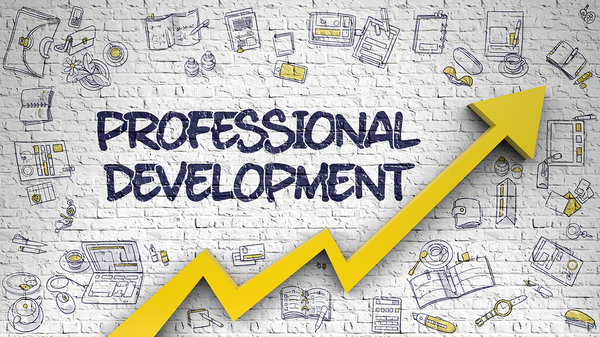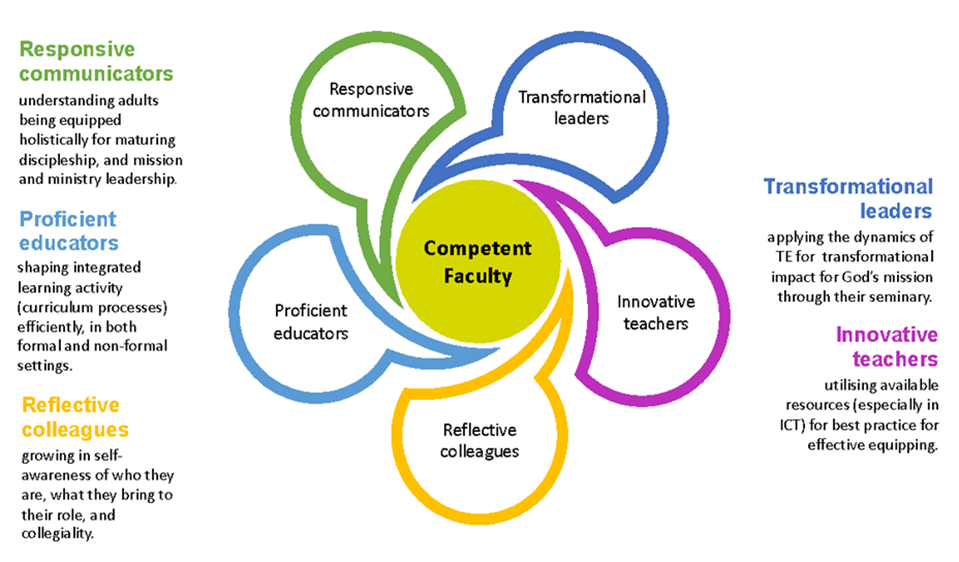
1. About FEI
FEI’s focus – in a nutshell
FEI partners with faculty members of Asian seminaries in their quest to more effectively facilitate the potential and ability of their seminary to have a significant impact for God’s mission through the Church in their country – and beyond.
FEI enhances faculty competence
Seminaries are deeply committed to their mission – and their faculty play a key role in fulfilling that mission. Faculty members usually bring enthusiasm, vigour and purpose to their role. But if they are to be effective, they need enhanced competency in the many aspects of their roles.
We recognise 5 main domains of competency for seminary/Bible college faculty members:

We hope that your participation in FEI enrichment activities (EAs) will – step by step – result in your enhanced competency to help your seminary achieve its commitments to God’s purposes in its unique context.
What FEI values
Key values expressed in FEI include:
2. Who for?
All seminary faculty benefit from life-long professional development – and all are encouraged to participate in FEI activities, however long they have been faculty members.
However, FEI is designed especially for new-ish faculty members – those who have been on the faculty for up to about 3 years, who are building the foundations of appropriate perspectives and competencies for the complexities of their role. Adjunct and affiliate faculty, as well as proposed incoming faculty, will also benefit from participation.
FEI’s enrichment activities (EAs) are usually undertaken with three or more faculty members of the same seminary.
3. Enrichment activity matters
Enrichment activity process
FEI isn’t a set ‘program to complete’, so there is no specific duration for participants to ‘sign on’ for. EAs are usually carried out in small, short modular blocks that target one specific aspect at a time. Each EA may comprise several components, and span up to 2-3 months.
Two main components may be built into FEI EAs – group enrichment activities and mentoring. Which of these is adopted for a particular EA will be decided in consultation with the participants.
1. Group enrichment activities
A wide range of learning processes and pathways are available to enhance effectiveness and competency. Components for a group enrichment activity may be drawn from these (and other) possibilities:

- A short workshop-style event.
- Participants undertake an ICETE Academy or other internet-based course and then interact with the facilitator on it.
- Participants watch a relevant TED talk or other professional development input, and then interact with the facilitator on it.
- Participants and the facilitator interact on a small selection of readings on the particular focus/ topic.
- Participants undertake a reflective practicum.
- Participants interact with one another and the facilitator on questions for reflection and/or group discussion on-line (e.g. on-line, in a WhatsApp group, etc.).
- …. and more.
2. Mentoring
Participants may also sense the need to work intentionally with a mentor(s) on a particular aspect(s) of the five domains of competency. Mentoring may take one of two forms:
- Senior colleague mentoring: An experienced theological educator will mentor participants – one-to-one or in a group – for an agreed period of time (e.g. 3-12 months).
- Peer encouragement group (PEG): A PEG is a collegial process in which participants are encouraged to support each other in specific aspects of their role.
Enrichment activity language medium
The primary language medium of EAs and resource material is English. But there will be scope for some bi-lingual activity. We will liaise with you if a bi-lingual setting is preferred.
Who are the facilitators/mentors?
FEI invites facilitators and mentors from the national, regional and international pool of experienced, competent theological educators who are aware of relevant educational (and specifically TE) theory and practice. We approach them for a particular EA according to identified priority enrichment needs and their likely alertness to the dynamics of the participating seminary’s situation.
Enrichment activity review/assessment
Some EAs may have some form of assessment of learning built in (e.g. an assignment(s), demonstration, etc.). Unlike typical seminary course assignments which need to be graded in order to receive credits, EA assessments are designed to help you to check your developing competence. They won’t be graded. And you don’t need ‘to pass’ one EA before undertaking another EA.
4. Recognition of competencies gained/enhanced
EAs which you complete will be recognised by a personal professional development transcript (issued by FEI/AGST Alliance) detailing the activities completed and the competencies targeted by those activities. This transcript will grow as you complete more EAs.
5. FEI’s educational level
FEI EAs are pitched at an academic level typical for professional certificates and diplomas. As an Asian-situated venture, FEI is adopting the standards of the ASEAN Qualifications Reference Framework.[1] The AQRF level for graduate certificates and diplomas is Level 6, summarised this way:
- ‘Demonstration of knowledge and skills that are specialised technical and theoretical within a specific field, and involve critical and analytical thinking .
- Recognises that the contexts in which the knowledge and skills are demonstrated are complex and changing; and require expert judgement and significant responsibility for professional knowledge, practice and management.’ (AQRF, p. 6)
The purpose of Level 6 is stated by the Malaysian Qualifications Framework (MQF)[2] as:
… to produce graduates who are capable of applying technical and theoretical concepts in a narrow range of contexts to undertake professional work… for purposes of continuing professional development [and] changing a field of training or expertise. (p. 25)
6. Financial matters
Fees for participation in FEI EAs are kept as reasonable as possible. We will advise you of the specific fees for each EA before it begins. Payment of fees may be made at the conclusion of an EA.
Your fees may be covered in several ways:
- Your seminary may be willing to cover some/all of the fees for an EA you undertake, as part of its commitment to having well-developed faculty.
- You may need to cover some/all of the fees personally.
- Your church or friends may be willing to support you financially in this strategic aspect of your professional ministry development.
- We may be able to cover some/all of the fees through scholarship support.
We recommend that you discuss the financial aspects of your participation in EAs with your seminary leadership in the first instance.
7. Contact details
For further questions about FEI, please write in to fei@agstalliance.org.
FEI Co-Directors
Dr Allan Harkness
Dr Sooi Ling Tan
Resources and Systems Developer
Dr Justin Peter
[1] The ASEAN Qualifications Reference Framework was endorsed by the ASEAN Economic, Education and Labour ministers in 2014-15. See https://aanzfta.asean.org/media-releases/asean-qualifications-reference-framework-aqrf.
[2] Malaysian Qualifications Framework (MQF), 2nd Edition, 2017.
